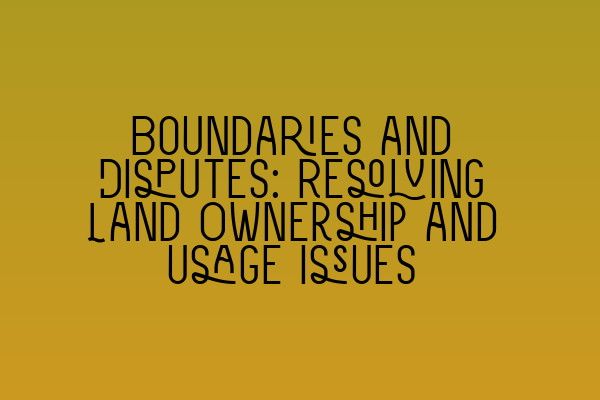Boundaries and Disputes: Resolving Land Ownership and Usage Issues
As a leading solicitor at SQE Property Law & Land Law, I understand the complexities and challenges associated with land ownership and usage. Disputes regarding boundaries can arise for a variety of reasons, such as unclear land descriptions, encroachments, adverse possession claims, or disagreement between neighboring property owners. If you are dealing with such issues, it is crucial to take proactive steps to resolve them effectively and efficiently. In this blog post, I will delve into the topic of boundaries and disputes, providing valuable insights and guidance on how to navigate through these challenging situations.
Understanding Boundaries: The Key to Resolving Disputes
Land boundaries, also referred to as property boundaries, define the extent of ownership and usage rights. They provide a demarcation that separates one property from another, allowing owners to exercise control and enjoy their land. However, boundaries can sometimes be unclear or disputed, leading to conflicts and legal dilemmas.
To resolve such issues, it is essential to have a comprehensive understanding of the legal principles and regulations surrounding land boundaries. This knowledge will enable you to assess the situation accurately, determine your rights, and develop effective strategies to address any disputes that may arise.
Importance of Accurate Land Descriptions
An accurate and well-documented land description is the foundation for clearly defining property boundaries. It is crucial to ensure that land descriptions include precise measurements, reference points, and any relevant easements or restrictions. Inaccurate or incomplete land descriptions can create confusion and lay the groundwork for boundary disputes.
To ensure that your land description is accurate, consult with an experienced solicitor who specializes in property law. They will guide you through the process, ensuring that all relevant details are included, and assist you in rectifying any deficiencies in the existing documentation.
Encroachments: A Common Source of Boundary Disputes
One common boundary dispute arises when one property owner encroaches upon another’s land. Encroachments occur when a structure, fence, or any other improvement extends beyond the legal boundary and onto a neighboring property.
If you suspect that an encroachment has occurred, it is crucial to address the issue promptly. Ignoring it can lead to further complications down the line, including adverse possession claims. Engaging a solicitor with expertise in property law will help you navigate through this situation, ensuring that your rights are protected and a suitable resolution is achieved.
Adverse Possession: A Potential Legal Claim
Adverse possession is a legal doctrine that allows a person to claim ownership of another individual’s land if certain criteria are met. This can be a contentious issue, as it involves proving continuous and exclusive use of the land for a specified period, typically between ten and twelve years.
If you find yourself facing an adverse possession claim or if you believe you may have a valid claim yourself, seeking legal counsel from a knowledgeable solicitor is advised. They will evaluate the circumstances, gather the necessary evidence, and advise you on the appropriate course of action.
Methods of Resolving Boundary Disputes
When it comes to resolving boundary disputes, there are various approaches that can be used, depending on the specific circumstances. These options include negotiation, mediation, arbitration, or, as a last resort, litigation.
Negotiation allows the parties involved to engage in open dialogue and reach a mutually agreeable resolution. Mediation involves the assistance of a neutral third party who facilitates discussions and helps find common ground. Arbitration is a more formal process where an independent arbitrator makes a binding decision. Litigation involves taking the matter to court, where a judge will make a final determination.
Choosing the most suitable method of resolution depends on the particularities of your situation. A solicitor experienced in property law will guide you through this decision-making process, ensuring you are well-informed and prepared to choose the most appropriate path forward.
Expert Legal Advice for Boundary Disputes
At SQE Property Law & Land Law, we understand the significance and complexity of boundary disputes. By leveraging our expertise in property law and our deep understanding of land ownership and usage issues, we provide effective legal advice and representation for our clients.
If you are currently facing a boundary dispute or simply seek legal guidance regarding land ownership and usage, our team of solicitors is here to help. We offer comprehensive SQE 1 and SQE 2 preparation courses and practice exams, ensuring that our solicitors are well-versed in the relevant legal principles. Contact us today to learn more about our services and schedule a consultation.
Related Articles:
– SQE 1 Practice Exam Questions
– SQE 1 Practice Mocks FLK1 FLK2
– SQE 2 Preparation Courses
– SQE 1 Preparation Courses
– SRA SQE Exam Dates
